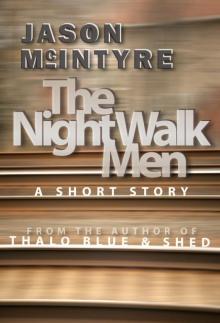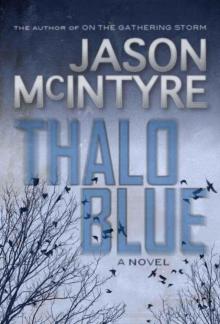- Home
- Jason McIntyre
Thalo Blue Page 2
Thalo Blue Read online
Page 2
“—He just is. Please—goddammit. Please.” And with that, Sebastion added the detail he had not dared to think. The one forcefully pushed out of his head since this whole nightmare had started: “He might be armed.”
<><><>
The sirens grew. Sebastion, in his cubby-spot, heard them too, became red in the face with the renewed hope they brought. And here, this intruder, this stranger, heard them rise. Perhaps this was at an end. They were close and he had nothing, no way out this time. But they didn’t know he was here, didn’t know he was sitting on this sofa, in this room, in this house. They didn’t know that because there was no way they could have. The other homes on this street were too far off to have heard that window break, too far off and too hidden by thick stands of trees, to have seen him in the yard trying the handle on the back door then climbing up on that box of firewood. No one would have called anyone. And besides, this house was empty.
He had stood on the bricks of the flower enclosure in front of the only window with a light, pressed his fingers against the sill, and peeked through the dim glass and beyond it. Nothing. No one. Not a figure to behold.
This house was empty.
<><><>
Sebastion’s father hated cordless telephones. He had insisted, on several occasions, that there would never be a cordless telephone in his home as long as he was alive. They just weren’t technologically-advanced enough yet to compete with the clarity of a corded phone. In fact, Oliver Redfield was so adamant about his beliefs in the quality of a phone connection that every single phone in the Redfield residence was identical. The one on the wall in the kitchen, the one in the basement, the one in the office at the back of the house, and this one, the bedside set which his son, Sebastion Redfield, lay clutching to his ear with sweaty hands. They were each the exact same model: a tan desktop three-line business unit, square base with rounded corners and gray buttons, something you’d find on any desk in any cubicle of any office tower downtown. The redial function, the mute, the flash, all the buttons were in the exact same spot on each telephone so Mr. Redfield never needed to hunt for a function when he needed it. A whirlwind on the telephone, his conversations were a brunt force that swept through and silenced those on the other end. He would spit his instructions into the receiver, snap bye at whoever it was, then hit a line button to spit at someone else. Oliver’s mind was one of precision and single-purpose and be damned if he would waste time looking for a button if he didn’t have to.
The tan cord on the master bedroom’s telephone, spiraled plastic and wire, ran from the nightstand down to Sebastion. It carried to him the voice of a distant woman, a savior, he thought, one that could solve this whole mess and carry him away from it on her back. But now, there was a pause coming from the imaginary other side of the conversation. The idiots, the whole world village of them, were in a meeting. Leave a message. Wait your turn. Make an appointment. Come back later. The emergency operator had fallen silent for a speck of time and Sebastion could again hear the pounding of his heart in his ears. It was a loud drumming, out of time, and he tried to silence it. Or ignore it. But he could do neither. He lay there on his peculiar slant, one shoulder against the cold wall, the other pressed into the carpet, listening intently for the operator’s voice to come back. He pressed the handset harder and harder against his reddened ear, straining to hear anything from it. He concentrated, willed her to begin saying something, anything, and in the interim, he started to imagine things. Everything he saw, he realized, was awash in a yellow tint, everything: the walls, the bedsheets, the carpet. He shook his head a little, knowing what it meant, but not wanting to. It led him to imagine—after the operator had typed details on her keyboard and after an address had been given by a dispatcher to a police cruiser already en route down Yonge—that there were gentle footsteps settling into the hallway rug, coming closer to his set-ajar door. That mental image blurred beneath a yellow wash too and just as he convinced himself that these phantom steps were actually counterfeit, they stopped just outside the bedroom door. A creak in the floor, one that he knew since childhood, made them real. The footsteps in the soft carpet, just like the ones in the crunchy snow outside his window, were not a product of a fevered mind.
The hinges of his bedroom door gave a drawn-out squeak and Sebastion’s breath hitched like a prickly bur in his throat.
The operator’s voice came back all at once with a million words of nonsense that he couldn’t understand, couldn’t hear, didn’t want to be spoken aloud. He’s coming. Oh by God, he’s coming into my room, he wanted to scream at her. He hated her now, she was not his savior, she was the enemy too, she with her loud voice creeping into the space around the bed. Her words were loud whispers, volume rising as they traversed the brisk air in the room and cascaded like caterpillars on the molecules of space all the way to that stranger’s ears. She wanted the stranger to hear her, Sebastion knew it at that moment, knew that she would never keep quiet. Here now, just a moment after he had silently begged her to be there and save him with her voice, he wanted her gone, wanted her silenced. He’s coming and he can hear your voice. Shut up! Shut the hell up! But he didn’t say anything to her. Couldn’t. And she kept talking, oh she kept talking. It was reassuring trivial talk mostly, empty, just her hating him so much that she wanted his hiding spot uncovered. Oh she hated him! More questions came from her, traveled the air, ah this woman who was working with the stranger to flush him out: Where is he now? the hating voice asked. Can you hear him? the disembodied co-conspirator wanted to know. Has he left? the operator said in his ear, secret code words that would take flight and seek out strange eardrums.
Sebastion was silent, betrayed. His gangly metal limbs were locked still. All he could do was lay there, his eyes twitching at the strange canted view: the edge of his bed where twisted sheets strew down on him. And beyond it? The ceiling where a slight round glow from the bedside lamp lay, for the moment unhindered. That was nonsense. That this stranger could hear the operator’s code words, her near-silent muffle of tones from the receiver, pure nonsense. The figure would not see him here either, would not know that he lay hidden in this spot. Oh but would surely see the slight quiver in the telephone cord running from the tan base where the gray buttons were, down from the nightstand to the handset, pressed hard against his ear. The stranger would see that cord and know that someone lay at the other end of it.
The lamp’s glow was broken. It came from the edge of the rounded light-shape, whatever it was, and it moved across, as if in slow motion. The wash of piss-vibrant yellow intensified and he was positive he would pass out. Then everything sped up. The color blared loudly. A figure, impossibly large, fell across his vision, blurry with movement. With both hands the figure reached down to the space between bed and wall. It grabbed Sebastion by his neck and hauled him to his feet. Sebastion’s first thought was a panicked cry, Do I know this face? All grown up but the same—have I seen this face before?
The wash turned from yellow to a concentrated orange, one that screamed inside his head. He screamed too, at least he tried to. It came out of the base of his throat more like a stifled call in a windstorm with gravel and dust kicking at the words. It was the staggered, helpless plea of a man who did not know what was going to happen to him, and it ended in a gagging, choking sound as pressure from the stranger’s hands intensified. Thoughts were lost. The face looked vacant. It looked like nothing—like no one—he had ever seen before. The handset fell from Sebastion’s twisted fingers, clacked against the wall under the curtains, and trembled on the carpet with a muffled voice still coming from inside. He stood now, fully gripped by this unnaturally large-seeming man, and he looked into those eyes, the dark, brilliant eyes of a stranger.
<><><>
Part of Emergency Operator Forty-One’s training was to remain calm—excruciatingly benign, if necessary. Cold and detached, if called for. In fact, that was the biggest lesson her training ever taught her and she remembered it like an animal instinc
t, drawing from it for each and every duty call she received. Remaining calm was like a chemical sedative. Experiencing it induced calm in the person at the other end of the line—she knew that well. Though the caller could inevitably be experiencing the most terrifying moment of his life, she knew that the human brain could be trained easily and quickly, taking her offered sedative as if she had dissolved it in a glass of water. A troubled mind can stand apart from the horrors where it dwells. It can be productive—even in shock, even in the direst times.
Forty-One knew this to be true—true without pause. The brain could, even though it was under a tumultuous strain, hear another calm voice through its aural facility and mimic that demeanor. The calm would spread, Forty-One’s instructor had told her. It would spread easily and more quickly than you can imagine. Your caller will regain some semblance of composure, not completely—no not ever completely—but he’ll be able to give you the information you need to do your job: address, location within the house. What you’ve got to do is learn the right questions in any situation, deliver them with that calm you’ve learned, and get the correct details that will save his life: whether the suspect is armed, if anyone has been injured. And in those rare instances when you can’t be the calm for him, when he can’t learn it from your voice, you’ve got to search it out in his. You’ve got to put on your goggles and your hard hat and you’ve got to go digging. Somewhere in the back of his screams, you’ll hear it. You’ll hear whatever he’s trying to tell you.
But Operator Forty-One, the one on duty that morning, the one that got Sebastion Redfield’s frantic call in the minutes just before the sun would peer across the icy landscape, she heard something in his voice that actually made her spine tingle: a full sixty seconds of silence, a set of scrapes, muffled grunts and bumping noises—then a stifled yell which made her sit upright like an ironing board in her chair. She heard it with absolute clarity, despite his hysterical crawling voice, despite the sudden volume and the garbled way in which it came out. For the first time in Forty-One’s seven year career as an emergency operator, she was in that room with one of her callers. And the words that came, the words which she had heard clambering in the back of his throat, the words which he himself didn’t know had been called out were these:
“He’s in here.”
<><><>
Instructions from the dispatcher via the 911 operator had told Officer William Sheers and his partner, Owen Lipnicki, that a forced entry would be necessary. “Suspect is possibly armed. Victim is potentially injured. Location: front-facing east bedroom. End of the hall. Last door on the right. Hurry.”
After careening through a ridge of packed powder and across an icy street gutter the cruiser’s tires stuck to a halt on the front lawn, the officers unstrapped a two-man battering ram from inside the trunk and carried it to the front door across the snow-covered yard of scattered evergreens. Their black boots crunched and squeaked in the blue-white snow. In the distance, more sirens blared. Three more cruisers would appear in less than four minutes. In less than two it would all be over.
<><><>
This doesn’t happen in my neighborhood. This doesn’t happen in my neighborhood. This doesn’t happen in my neighborhood. Sebastion repeated that in his head, almost like a mantra, almost as though the repetition of it would return him to the warm bed of before. Silent slumber under eaves of ice and snow, safe from the outside. Safe from all this, a time before footsteps in snow, a time before broken glass, a time before terrible looming strangers with dead-cold hands. A horrifying banging had started at the front of the house, after a siren had sung loudly then died away.
This doesn’t happen in my neighborhood.
It was true. Things like this didn’t happen here. He had grown up in this house, in this neighborhood, in this little city on the edge of a behemoth one, and never had he been fearful of robberies, break and enters, suspicious prowlers. But first times always come, don’t they? First times always march in like foreign troops coming over the rise. Oh God, why did it have to be me? Why did they have to march into my camp? He couldn’t overcome the shock of it; here he was with his feet loosely touching the carpet below him, his toenails actually scraping it a little, and his neck held firmly in this otherworldly grip. Just make it stop, his mind pleaded. Oh please oh please oh please, just make it stop! Somewhere beyond the bedroom to his left and beyond walls and hidden closets where cool air lay unstirred, unbreathed—like that under his bed—came that continued set of deafening thuds. They were spaced apart and even. They were shocking, earsplitting and overwhelming. Was this more to contend with? Another set of hands that would wrap around him, smother him? Or a saving grace of brute force that would commandeer these cold clenching tree roots below Sebastion’s face, wriggled up under his chin and pressing his clavicle. Was there anything on the green earth pervasive enough to just make this all go away?
He was conscious only of details, minutiea: the hands, their size and ice-touch, the banging of dispatched saviors—or perhaps the devil’s other hand—at the front of his home. But the shock remained. Despite recognizing such odd and unnatural elements for what they were, for what they could be, he simply couldn’t bend his mind around what was happening to him. There were these eyes staring at him, through him, dark and insidious. And his were locked into them, two pools of black tar, seemingly despondent and unaware, but bulging at him nonetheless.
These were impossibly fine points to be noticing while insanity’s will held him by the throat but Sebastion couldn’t help it. He saw tiny shards of glass sticking from small bloodied wounds up and down the stranger’s face. And there were similar lines drawn longer on the bronze skin of those tree-trunk arms. But the figure’s mouth was tightly closed—the stranger was staring Sebastion down with a voiceless evil.
The madman hadn’t said a word, hadn’t made a threat, hadn’t uttered a whisper, hadn’t let out a grunt, a sigh or even a breath of air from his mouth. But he did so now. At least, he tried to. His lips, dry as charred paper, parted and all that came from between them was a gurgling dribble of blood together with a stuttered, guttural sound from deep down in the man’s chest. The blood dripped to his chin in three thick lines and on his own lips Sebastion felt a small rush of air, barely noticeable, except that he was so close to its source. His eyes trailed down to the source and fell on a gaping, bloodied hole in the stranger’s neck, just above the clavicle and to the right of his throat’s center.
Even with that, even with the shocking sight of that hole he thought he could see right through, he was unwilling to admit the earthliness of his reality. He banged fists against the arms, shoulders and chest of his oppressor. He twisted at the reddened fingers and wrists clutching him, seizing him, controlling him. He clawed at the awful, dead roots holding him by the throat, struck them and strained at them for release. His eyes felt bulgy now too, the inside of his esophagus like a wet paper tube smothered under the wheels of a bicycle. His cheeks and forehead burned like a hot sun had baked them for three hours and would never again let them cool. But his fingers couldn’t get a grip on the man’s hands. They were just too powerful, like steel vice grips which would never give way, would never even rust.
The wholly improbable banging, loud and rhythmic, had come to an abrupt and welcomed end with one final, monstrous wham. The front door had burst on its hinges. Wide open, like a giant wooden tongue, it crashed against the front closet.
On the heel of that? Nothing. An exhausting silence. The bedroom had become a vacuum. Every brush of fabric, every sweep of body against body, every living breath in and out, could be broken down into its explicit fragments. Sounds were in his head now. They weren’t real but instead wore the paint of an elaborate surface where brushstrokes could be magnified and studied in detail. Please, he wanted to say to these eyes that gouged through him, please just let me go. Just make it stop—I won’t press charges. It’ll—
One of the cold, forceful hands finally eased, making the blood pound hard
er in his temples. There was a borderline ebb of the heat and pressure in his face. He felt tears coming but held them. His eyes remained fixed on those of the stranger, the eyes of the stranger fixed on his. A flash of something dark came into the corner of his vision. His eyelids flicked at it.
So there it was, what he had dared not imagine, what she had called the inevitable beginning of his absolute fade away. This was the part where Sebastion met his God—where time came screeching to a halt on a needle’s point—she would have said, if she had been here to witness it. This is that endless second where divinity would be made real for him. And those words, divinity and fade away, made the tears finally come. They trickled to his hot cheeks in thin streams. The deeper fears—the ones he had quietly told the operator—had become real.
The stranger was armed.
In one movement, the derringer’s barrel was pressed into the side of Sebastion’s jaw and he was whirled around to face the door. His eyes were no longer on those of the man who held him, were no longer, in fact, even able to see the mad man at all. The sight of the bloodied lips, the dime-sized hole in the black char and red tissue, and the bulging eyes of sober damnation were hidden somewhere behind him. He felt nothing but a balmy, passive breath on the base of his skull.

 Dark That Day, After All
Dark That Day, After All Dread
Dread Bled
Bled Instead
Instead Fled
Fled Fled (Dovetail Cove, 1973) (Dovetail Cove Series)
Fled (Dovetail Cove, 1973) (Dovetail Cove Series) Zed
Zed Instead (Dovetail Cove, 1979) (Dovetail Cove Series)
Instead (Dovetail Cove, 1979) (Dovetail Cove Series) The Night Walk Men
The Night Walk Men Deathbed (Dovetail Cove, 1971) (Dovetail Cove Series)
Deathbed (Dovetail Cove, 1971) (Dovetail Cove Series) Redhead (Dovetail Cove, 1974) (Dovetail Cove Series)
Redhead (Dovetail Cove, 1974) (Dovetail Cove Series) Thalo Blue
Thalo Blue Shed
Shed Shed (Dovetail Cove, 1977) (Dovetail Cove Series)
Shed (Dovetail Cove, 1977) (Dovetail Cove Series) Redhead
Redhead Dread (Dovetail Cove, 1978) (Dovetail Cove Series)
Dread (Dovetail Cove, 1978) (Dovetail Cove Series) Zed (Dovetail Cove, 1975) (Dovetail Cove Series)
Zed (Dovetail Cove, 1975) (Dovetail Cove Series) Unwed (Dovetail Cove, 1976) (Dovetail Cove Series)
Unwed (Dovetail Cove, 1976) (Dovetail Cove Series) Bled (Dovetail Cove, 1972) (Dovetail Cove Series)
Bled (Dovetail Cove, 1972) (Dovetail Cove Series) Deathbed
Deathbed